When this novel was first published in 1979, the leading critics had difficulty classifying the work. It wasn't exactly an espionage thriller or an epic, but it seemed to touch upon many genres and themes.
Shibumi is a fictional biography more than anything else, for its central character, Nicholai Hel, is the tale's main concern. A minor character in the story sums up the protagonist superbly at the end of the book by calling him half saintly ascetic, half Vandal marauder - a medieval anti-hero. Nicholai Hel is your vintage 'man-against-the establishment' with a mind like a steel trap and the tastes and lifestyle of an 18th century aristocrat.
Hel's
pedigree is a throw back to the German/Russian elite, where
generations of breeding and culture have contributed to his unusual
character. Nicholai is a man without a country, a natural mystic,
philosopher, linguist, master of Go, a complex Japanese board game of
high strategy, and most importantly, a self trained assassin for hire
who is expert in the arts of naked/kill. More than this, he is a
seeker of spiritual perfection, his ultimate goal being that hard to
define state or condition known as Shibumi.
Trevanian (Rodney Whitaker) is a first rate writer. His technical skill in the craft well exceeds many leading 'thriller' writers of today.
When one reads about the art of naked/kill, the mystical states of Nicholai Hel, or even the machinations of the CIA and their unscrupulous methods for creating and combating terror, one gets the distinct impression that the author knows exactly what he's talking about and must have access to some kind of inside information. His writing is almost too believable.
Throughout the reading, I had to continue to remind myself that this novel was written in 1979, well before the general public had any concern about terrorism. Other than the main character, this tale is about corruption in governments, who will go to any lengths to secure oil rights in the Middle East. The book is also about technology, which has aided civilization in many ways, yet has eroded our basic values.
In
many respects, Nicholai Hel is a modern Luddite, despising machines
in all their forms, and the waste they create. Nicholai Hel is an
'every man' character, a representation of the virtuous individual,
alone and pitted against the dangerous technological and consumerist
values of the herd. In the end, however, does Nicholai Hel win this
battle over the modern, vulgar, techno-centred majority and finally
attain 'Shibumi'?
This work should be considered a classic, for it has a timelessness about it, and can be read many times, for it will continue to offer intellectual stimulation as well as pure entertainment for many years to come.










